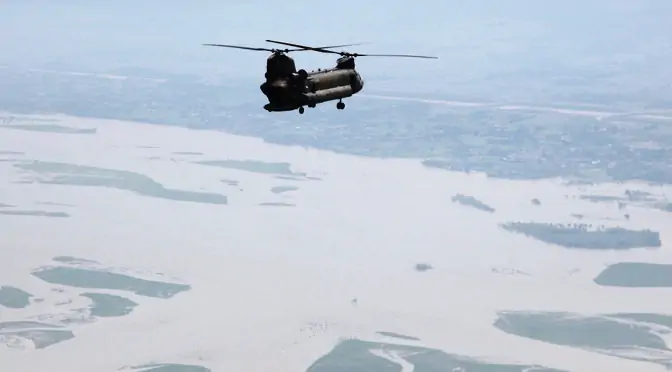Events show that Pakistan is on the most advanced front lines of climate change. How thus should we re-read the already complex and interacting geopolitical, geostrategic and domestic situations of Pakistan and what does that mean strategically for the region and the world?
Tag Archives: U.S
The Red (Team) Analysis Weekly – 30 January 2014 – Perceptions and Facts
Editorial – Perceptions and facts – Besides the acceleration of the regionalization and internationalization of the Syrian war and quagmire, besides the futurist use by Erdogan of “hologram to address party members” (imagine a world where such practice would be common), among others, this week presents us with two very interesting instances of the importance …
Continue reading “The Red (Team) Analysis Weekly – 30 January 2014 – Perceptions and Facts”
How to Analyze Future Security Threats (5): Scenarios and Crises
This article is the fifth of a series looking for a methodology that would fulfil the challenging criteria demanded by our time, notably in terms of speed and resources. The previous article focused on how to build scenarios for war.Here we look at scenarios for situations qualified as non-violent crises, taking mainly as example the crisis between China and Japan in the East China Sea over the Diaoyu (China)/Senkaku (Japan) Islands. War or crisis? It is important, first, to note that the words used in political discourses to qualify a situation may create an element of confusion when we think about an issue such as crisis, conflict and war. Actors may have many reasons for using euphemisms rather than factual, …
Continue reading “How to Analyze Future Security Threats (5): Scenarios and Crises”
The Red (Team) Analysis Weekly – 9 January 2014 – Contrasts
Editorial – Contrasts – The year starts with interesting contrasts. On the one hand we have more than worrying trends. The Syrian conflict continues spreading as, notably, Iraq seems to be falling back into war – as could be expected from the continuously rising numbers of attacks and death over 2013 (if you have not seen …
Continue reading “The Red (Team) Analysis Weekly – 9 January 2014 – Contrasts”
Arctic Warming and Eurasian Grand Strategies
In May 2013, several Asian countries obtained the status of “permanent observer” at the Arctic Council, the body that gathers the eight countries bordering the Arctic. These new “observers” are China, India, South Korea, Singapore, and Japan (Russia Today, Northern exposure, May 15, 2013). This rush of Asian (some of them tropical and equatorial) countries to the Arctic is one of the most important dimensions of the current global race to the Arctic region (see Valantin, “Arctic, the New great game”), triggered by the combination of the rapid warming of the North and the global competition for natural resources (Klare, The Race for what’s left, 2013). The new grand strategies ruling over this race to the Arctic, which combine national …
Continue reading “Arctic Warming and Eurasian Grand Strategies”
The Arctic Power Race: the New Great Game
This post opens a new series dealing with the Arctic, its environmental change and its evolving geopolitics and security. The Arctic death spiral, or “Melting is coming” Thanks to the widespread rapid melting of Arctic sea ice during the 2013 summer season, a Chinese freighter crossed the famous Northwest passage, shortening its journey from Dalian, China, to Rotterdam, by more than two weeks in August 2013. Between 22 and 26 September, the Nordic Orion, a bulk freighter going from Vancouver, Pacific Canada, to Finland, used the same passageway. It was transporting coal. The opening of this mythical passageway in summer over the last few years is the result of the way global warming is massively impacting the whole Arctic region. …
Continue reading “The Arctic Power Race: the New Great Game”
The Red (Team) Analysis Weekly – 19 December 2013 – Pivot, center and epicenter
Editorial – Pivot, center and epicenter – First of all, let me wish you all a Merry Christmas, and send this wish especially to those who are prey to war and disaster, whatever their faith. This week, the epicenter or the pivot for the turmoil of change seems very much to be located around the …
Continue reading “The Red (Team) Analysis Weekly – 19 December 2013 – Pivot, center and epicenter”
The Red (Team) Analysis Weekly – 12 December 2013 – Russia, the Arctic and … Syrian uncertainties
Editorial – Russia, the Arctic and … Syrian uncertainties – If you were looking for a new tense area to monitor, here it is: the Arctic. We had known it was coming for a few years, but now it is definitely on the agenda, besides, mainly, the Middle East, North East Asia and a struggle for …
The Red (Team) Analysis Weekly No128, 28 November 2013
Editorial – Si vis pacem para bellum (If you want peace prepare for war) and biases – The continuous escalation in East Asia is worrying to say the least. We have increasingly stronger signals pointing towards the possibility of war, including considering Japan’s challenging domestic situation. Windows of opportunities to de-escalate are most likely to open too in …
Continue reading “The Red (Team) Analysis Weekly No128, 28 November 2013”
The Red (Team) Analysis Weekly No124, 31 October 2013
A new world order in the making: America, Britain and Russia – The world is changing and the decisions taken by the various actors are not only reactions to those changes and their anticipated direction and impact, but also contributions towards the very evolution of the system. We thus see the U.S. revising – rather …
Continue reading “The Red (Team) Analysis Weekly No124, 31 October 2013”






